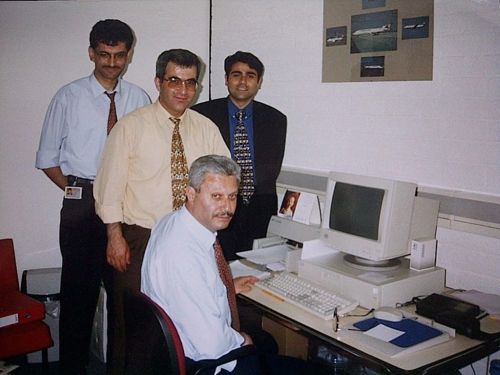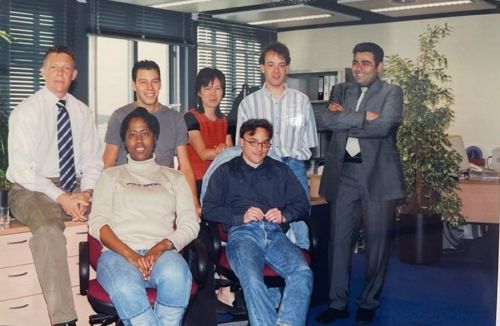
Pictured: Ismail Durmaz, CEO of Global GSA Group
Career paths do not always lead to where you expect, often, it takes you on an exciting journey that you had not planned. This was the case for Ismail Durmaz, CEO of Global GSA Group who entered air cargo when taking a friend to an employment agency.
Durmaz had wanted to be a professional footballer and was pretty good on the pitch but the competition was tough and being good was not good enough. He explored other options including coaching before moving into electronic engineering.
This was when career got ready for take-off; a friend was looking for a job so Durmaz took him to an employment agency where they met a girl who knew someone at ChartAir, based at Amsterdam Airport Schiphol, and they were looking for someone to work in the freight industry.
Durmaz explains, “At the time I was working in electronic engineering, as it was my first training, but I decided to go for the interview anyway. At first, they didn’t want to hire me because I didn’t come from the freight industry, but I argued that it was unfair to judge without giving me a chance first.”
The recruiter agreed to give Durmaz a chance and the next day he started his journey in the air cargo industry.
Working at ChartAir opened up the opportunity to develop into a GSA. Global Airline Services, the original structure of Global GSA Group, was founded in 1995 by Jos Busscher with partners Kitty Liao and Kees de Groot.
Busscher had sold his charter company to Panalpina in 1995 and at the time, Durmaz was working for GSAs at ChartAir with Turkish Airlines.
Durmaz says, “As I had very good contacts with Turkish Airlines, Jos asked me to move the airline to Global Airline Services, offering me to be a partner in the company with the possibility of turning it into a real GSA. So I became CEO in 1999.”
Operating from an office in Amsterdam, offices in Belgium, Germany and France followed and the team were running Turkish Airlines, China Southern, which Global GSA still represents, Air Holland and Malév Airlines, and US Airways joined a little later.
Starting with six people, Global GSA had its eyes on expansion and five years later was present in six European countries.

Wealth of experience
Having worked in the air cargo industry for as long as Durmaz has, he is well placed to assess how the GSA sector has evolved.
Back in the mid-90s, it was more of a people business, says Durmaz, explaining that relationships and contacts one had were the number one lever in winning new business.
He says, “Today, that relationship, while still important, is no longer enough. You have to demonstrate a solid structure and share your data, as technology has also led to more transparency. The industry has become more professional, so to speak, and also more complex with the arrival of new players.”
The decision to award contracts is no longer on the say-so of one or two people but largely driven by automated systems but the industry remains people-oriented, especially at the managerial level, Durmaz says.
Without human relations, there would be no invitations to tenders and building up trust but making work digital has affected day-to-day work such as no longer needing to make phone calls for reservations, which has removed personal contacts.
The GSA’s role has changed, moving from being a sales organiser to greater dedication with an exclusive sales team for an airline to increase the services to help develop its business.
Durmaz says, “Another crucial point is the sharing of risk with airlines, a concept that before the 2000s made people smile and which today has become paramount.”

Global presence
In 2023, Global GSA Group lives up to its name with offices in all parts of the world except Africa and Oceania where it has developed partnerships with other GSAs to give itself a presence.
Global GSA Group is present in 46 countries with 74 offices, 37 of which are in Europe. Worldwide, it represents 62 airlines and employs 476 members of staff.
Durmaz is seeing an increased demand for GSA services from carriers with their own setups abroad saying that they are experiencing difficulties, which is influencing their performance. They face high operational costs and are running bigger risks with higher liabilities.
He says, “GSA companies have proven their value over the years, and even more during the pandemic, with their ability to rapidly adapt to new market conditions. As carriers serve more and more destinations, the outsourcing option is much more effective and efficient. Global GSA Group is therefore committed to gaining new market shares and has ensured that it is fully equipped to do so, both in terms of technology and human resources.”
The Americas and Southeast Asia are the focus areas, says Durmaz, saying, “The increase in e-commerce sales and the growth in global demand from APAC countries make these two regions important market drivers with many opportunities. We therefore plan to strengthen our position in these areas through the creation of new companies and the acquisition of existing ones.”
This article was published in the April issue of Air Logistics International, click here to read the digital edition and click here to subscribe.
